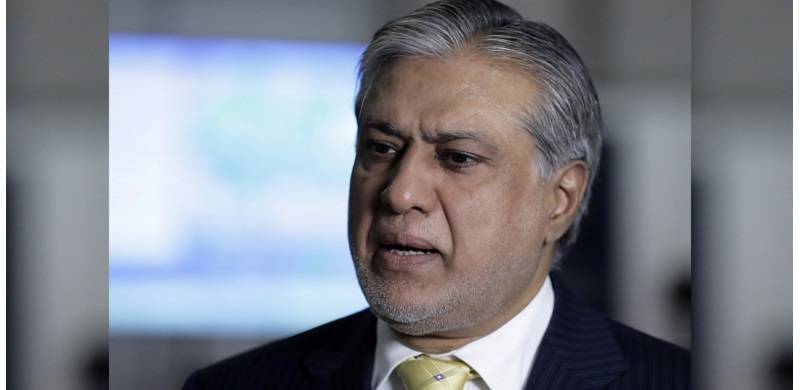
Finance Minister Ishaq Dar has said that negotiations with the IMF have neared their conclusion and the staff-level agreement with the global lender is likely to be signed by next week.
"Our negotiations with IMF are about to conclude and we expect to sign Staff Level Agreement with IMF by next week," Dar said in a Twitter post on Thursday.
He added that anti-Pakistan elements were spreading malicious rumours that Pakistan may default. "This is not only completely false but also belie the facts."
According to the minister, SBP forex reserves have been increasing and are almost $1 billion higher than four weeks ago despite making all external due payments on time.
Dar also highlighted that the foreign commercial banks have also started extending facilities to Pakistan.
The government is struggling to implement certain measures to finalise an agreement with the Fund to unlock a critical $1.1b billion loan.
Earlier today, the rupee fell abruptly by Rs18.74 against the dollar in the interbank market, with the local currency trading at an extreme high of Rs284.85 in morning trade, Exchange Companies Association of Pakistan (ECAP) data showed.
Economists believe the record drop is due to the government’s deadlock with the international lender.
According to the data shared by the State Bank of Pakistan on Wednesday, the rupee closed at Rs266.11 per dollar.
The currency has been sliding in recent days after delays in a deal between Pakistan and the IMF, which the two sides have been negotiating since February.
One of the things the international lender wants Pakistan to do is switch to a market-based currency exchange rate regime. If the IMF's board approves this measure, a funding tranche of over $1 billion would be released that has been held up since late last year over a policy framework.
The Fund's requirements are designed to make sure Pakistan reduces its fiscal deficit before presenting its annual budget in June.
The majority of the steps, such as increasing the cost of fuel and energy, ending subsidies in the export and power industries, and raising extra revenue through new taxes in a supplemental budget, have already been taken by Pakistan.
The steps will likely increase the already record-high inflation rate, which reached 31.5 percent in February.
The IMF has also asked Pakistan to increase policy rates and fulfil bilateral and multilateral external financing commitments.
"Our negotiations with IMF are about to conclude and we expect to sign Staff Level Agreement with IMF by next week," Dar said in a Twitter post on Thursday.
He added that anti-Pakistan elements were spreading malicious rumours that Pakistan may default. "This is not only completely false but also belie the facts."
According to the minister, SBP forex reserves have been increasing and are almost $1 billion higher than four weeks ago despite making all external due payments on time.
Dar also highlighted that the foreign commercial banks have also started extending facilities to Pakistan.
The government is struggling to implement certain measures to finalise an agreement with the Fund to unlock a critical $1.1b billion loan.
Earlier today, the rupee fell abruptly by Rs18.74 against the dollar in the interbank market, with the local currency trading at an extreme high of Rs284.85 in morning trade, Exchange Companies Association of Pakistan (ECAP) data showed.
Economists believe the record drop is due to the government’s deadlock with the international lender.
The majority of the steps, such as increasing the cost of fuel and energy, ending subsidies in the export and power industries, and raising extra revenue through new taxes in a supplemental budget, have already been taken by Pakistan. The steps will likely increase the already record-high inflation rate, which reached 31.5 percent in February. The IMF has also asked Pakistan to increase policy rates and fulfil bilateral and multilateral external financing commitments.
According to the data shared by the State Bank of Pakistan on Wednesday, the rupee closed at Rs266.11 per dollar.
The currency has been sliding in recent days after delays in a deal between Pakistan and the IMF, which the two sides have been negotiating since February.
One of the things the international lender wants Pakistan to do is switch to a market-based currency exchange rate regime. If the IMF's board approves this measure, a funding tranche of over $1 billion would be released that has been held up since late last year over a policy framework.
The Fund's requirements are designed to make sure Pakistan reduces its fiscal deficit before presenting its annual budget in June.
The majority of the steps, such as increasing the cost of fuel and energy, ending subsidies in the export and power industries, and raising extra revenue through new taxes in a supplemental budget, have already been taken by Pakistan.
The steps will likely increase the already record-high inflation rate, which reached 31.5 percent in February.
The IMF has also asked Pakistan to increase policy rates and fulfil bilateral and multilateral external financing commitments.

